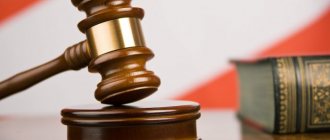Witness in trial
Leonid Evstafievich Vladimirov
The medieval philosopher William of Ockham (known primarily for the extremely useful rule for legal technology “not to create entities unnecessarily”) formulated another – procedurally important – principle: “nothing should be accepted without reason unless it is known either as self-evident or from experience"[1]. Subsequently, this rule was called the law of sufficient reason.
The purpose of the court is to resolve the dispute and bring legal certainty to the relationship between the parties. This is achieved by the procedure of proof, that is, by providing the disputing parties with a factual basis for their statements. That is, what is called the law of sufficient reason, which, in turn, serves as the logical beginning of reliability (principium evidentiae).
A very common type of evidence is witness testimony. But if in a criminal trial the main problem is to establish possibility and probability (what exactly the witness saw and whether he could have seen it at all), then in a civil trial everything is somewhat more complicated. Below is the decision of the Governing Senate, which addresses the issue of witness testimony.
***
The peasant Trushalov sought 68 rubles from the peasants Vasily and Gerasim Antonov. for hemp sold to him by their deceased father, Haggai Antonov, and not delivered to him, and 65 rubles. 50 kopecks losses caused to him by non-delivery of cannabis, citing witnesses as evidence of the claim. Magistrate Judge 1 of the Oryol district, having seen from the testimony and explanations of the defendant Vasily Antonov, that the Antonovs’ father really owed Trushalov 69 rubles, for which he promised to deliver 9 quarters of hemp, and that the price of hemp rose to 9 rubles. 15 kopecks, based on Art. 81 Set. Gr. Court. and 684 X T. 1 hour, ordered the Antonovs to return 68 rubles to Trushalov. and 1 rub. 65 kopecks for each of 9 quarters, only 82 rubles. 85 kop. The Oryol Congress, having considered the case on the defendants’ appeal and finding that, by virtue of Art. 409 Set. Gr. The court, the testimony of witnesses cannot be recognized as evidence of Trushchalov’s claim, overturned the Judge’s decision and denied Trushchalov’s claim. In his cassation appeal against this decision of the Congress, Trushalov explains: 1) that, by recognizing his claim as unproven, the Congress violated Art. 81 Set. Gr. Court., and 2) that, by eliminating testimony as evidence of the claim, the Congress violated Art. 409 Set. Gr. Court., since the purchase of hemp from Antonov and the failure to deliver 9 quarters of the purchased goods can be satisfied by the witnesses.
Having heard the conclusion of the Comrade Chief Prosecutor, the Governing Senate finds that, according to Art. 409 Set. Gr. Court, witness testimony cannot serve as evidence only of those events for which written evidence is required. Applying this law to any dispute, the court first of all (based on Articles 129 and 339 of the Constitution of the Civil Code) is obliged to determine which events constitute the subject of the dispute, and then enter into consideration of the question of what evidence these the controversial events can be proven by law and what evidence is presented in support of them in this case. In the present case, plaintiff Trushalov, referring to witnesses, argued that Haggai Antonov sold him hemp, received money for it, but did not give him all the goods sold; The congress, without discussing at all which of these events is refuted by the defendant and, therefore, appears disputable, found that witness testimony cannot be recognized as evidence of Trushchalov’s claim, while the sale of movable property, under Art. 710 X T. 1 part of the St. Law, can be committed without a written act and, therefore, if the defendant challenged the sale of hemp, the plaintiff had the right, under Art. 409 Set. Gr. Court., prove the sale by reference to witnesses; Likewise, the transfer of sold movable property to the buyer and the payment of money to the seller for this property, under Art. 1510 and 1521 X T. 1 part of the Holy Law, does not require written certification and in case of a dispute can be proven or disproved by the testimony of witnesses. Finding, therefore, that the Oryol Congress, having applied Art. 409 Set. Citizen The court, without proper explanation of what particular event in this case cannot be proven by reference to witnesses, committed a violation of the exact designated article of the Charter, the Governing Senate determines: the decision of the Oryol World Congress, on the violation of Art. 409 Set. Gr. Court., cancel and transfer the case for consideration to the Mtsensk Congress of Magistrates.
***
So the Senate made two important points.
1) Before making a decision, the court must clearly understand what exactly the dispute is about. There were no special rules on preparing a case for hearing, as is done in the modern Code (Articles 148, 150, 152)[2], in the Charter of Civil Proceedings; from the wording of the mentioned 129 and 339 articles[3], the rule of preparation could only be derived through judicial interpretation, which is what the Senate did in this decision.
2) And the main question: is testimony applicable in all cases? In this case, Article 409 of the Civil Code of Civil Code, mentioned more than once by the Senate, was established: witness testimony can be recognized as evidence only of those events for which, by law, written certification is not required[4]. This rule was supplemented by the following - 410 - article on the prohibition of refuting the contents of written acts by the testimony of witnesses (Roman maxim contra scriptum testimonium non scriptum testimonium non fertur - Code, 4.20.1).[5]
Since written form is not required to complete a transaction for the sale and purchase of movable property, there is no reason to limit the evidence base only to documents, as the Senate pointed out in this case.
The question of the applicability of witness testimony was considered very important. For example, in the 2nd volume of Isachenko’s commentary, devoted entirely (1038 pages) to the issue of evidence (Articles 366-565), the commentary to Article 409 occupies 127 pages (from 219 to 346), or 12% of the text (commentary to the main article - 366 – the article on the burden of proof – “only” 65 pages).
In a number of decisions, the Senate formulated other rules for testimony: “it is prohibited to refute by testimony the essence of legal transactions concluded in written acts, but the court is not deprived of the right to resort to testimony to bring to light the existence of such events, circumstances or facts that preceded or accompanied the completion of the transaction" (decision of 1867 No. 122); and on the proof of negative facts by witnesses (decision of 1907 No. 112): “the circumstance (that the testator never had children) as negative cannot be reliably known to the witnesses.”
In light of the above, one cannot help but recall the very relevant debates about the so-called before the privatization of housing and the Housing Code of 2004. recognition as having lost the right to use residential premises. They were based on the fact that one of the family members living (registered) in this apartment allegedly stopped using it and therefore lost the corresponding right. In confirmation of this circumstance, witnesses were cited (usually neighbors), who said that the defendant “does not live here,” or they have not seen him for the last time (week, month, year, etc.). The fact that the question is about changing the lease agreement, and that the landlord is a housing maintenance organization, and only it, as a party to the agreement, can bring such a claim was not taken into account.
[1] William of Ockham. De sacramento altaris, ch. 28.
[2] Unfortunately, the courts take a very formal approach to this issue, limiting all preparation to setting a hearing date.
[3] Here is article 339: the court's decision must be based on documents and other written acts presented by the parties, as well as on the arguments expressed during oral argument. It is curious that here (this article regulates the decision of general courts; article 129 - magistrates' rulings) the Charter says nothing about witness testimony. Evidence is not the testimony of witnesses; arguments are “a legal assessment, a critical analysis of evidence carried out by the parties, considerations through which the connection and relationship of the proven facts to the claim and defense is established” (Grigory Leontievich Verblovsky, Movement of Russian civil procedure, outlined in one example, M., 1905, p. 43); “abstract explanations and illumination from a certain point of view of the circumstances of the case and evidence supporting or refuting them” (Vasily Lavrentievich Isachenko, Civil Procedure. Practical commentary on the second book of the Charter of Civil Proceedings, volume 1, St. Petersburg, 1909, p. 774).
[4] The following are three exceptions—two involving force majeure and one involving “quiet, undisputed, and uninterrupted” possession or enjoyment of real property during the statute of limitations.
[5] Iering said that “the strengthening (fixirung) of an action in a person’s memory is less precise than on paper, extends only to the meaning, and not to the words, which sometimes have enormous meaning.” On the essence of legal formalism in general (from Igering). Journal of the Ministry of Justice, 1860, vol. V, part II, p. 386.
Who is not allowed as witnesses?
Certain categories of citizens cannot, due to objective circumstances, be involved in the case as a witness:
note
In case of violation of the rules established by law, liability for disclosure of personal data may follow. The Criminal Code of the Russian Federation provides for penalties up to imprisonment for up to 4 years. Read more in the article here
- Judges and juries may not provide information regarding the facts of a case in which they were involved.
- Lawyers cannot disclose information they learn in connection with the conduct of a person's case. The person who committed the crime, or when providing him with legal assistance.
- The priest cannot violate the secret of confession.
- A deputy of the State Duma, a member of the Federation Council may testify about circumstances that have become known to him in connection with his work activity only if he wishes.
- A tax inspector cannot talk about the data contained in a special declaration submitted in accordance with the legislation on the voluntary declaration of citizens.
- The arbitrator (arbitrator) does not testify regarding the circumstances of the case in arbitration.
Witness protection
To ensure that testifying does not have negative consequences for the witness, the Code of Criminal Procedure provides for its protection. The protective measures are as follows:
- Possibility to testify under a pseudonym.
- Identification of a suspect in conditions where the latter cannot see the witness.
- Conducting a court hearing behind closed doors.
- Giving evidence by a witness in court without disclosing personal information, as well as in conditions where visual contact of the witness with other participants in the process is excluded.
The difference between an attesting witness and a witness is that the latter gives evidence about the progress or details of the crime, while the attesting witness is involved in observing investigative activities within the framework of an already committed unlawful act.
How to interview additional witnesses?
Lawyer Antonov A.P.
The burden of proof of the commission of a crime and other significant circumstances, due to the provisions of Article 14 of the Code of Criminal Procedure of the Russian Federation, lies on the prosecution. However, this does not mean that the suspect (accused) should simply wait for his fate to be decided. Formally, the prosecution and defense have equal rights; they have equal opportunities to prove their position and can equally collect evidence. However, in reality, this provision is not observed, and the defense cannot even fully familiarize itself with the materials of the criminal case until the end of the preliminary investigation.
Only after this it becomes clear how justified the accusation is and what position is more advisable to take. From this point of view, it turns out that a lawyer can take serious steps to prove the innocence of the client only after the investigation is completed. To do this, when familiarizing yourself with the materials of a criminal case in accordance with Article 217 of the Code of Criminal Procedure of the Russian Federation or within 3 days after familiarization, the accused or lawyer must submit a petition for additional investigative actions.
Familiarization with the materials of the criminal case means that the preliminary investigation has been completed. However, this rule is often violated by the investigative bodies themselves. After familiarization, additional investigative actions (interrogation of witnesses, request of documents) are possible only at the request of participants in the criminal process, and not at the discretion of the investigator or on the instructions of the head of the investigative body. The situation when the investigator, on his own initiative, carries out investigative actions after familiarizing the participants with the materials of the criminal case and, more importantly, does not introduce them to new materials of the criminal case, is contrary to the law. Additional evidence is considered inadmissible.
There are often cases when the defense is unreasonably refused to carry out additional investigative actions or to include documents, including a list of witnesses who are to be summoned to the court hearing. According to Part 4 of Article 217 of the Code of Criminal Procedure, the investigator finds out from the accused and his defense attorney which witnesses, experts, and specialists are to be summoned to the court hearing for questioning and confirmation of the defense’s position. That is, this rule assumes that if a lawyer attaches a list of witnesses to be called, which contains their addresses and telephone numbers, then such a list is attached without a special order from the investigator.
Another violation is the unreasonable refusal to submit such a list. The reason for this is that its inclusion is not provided for by the norms of the Code of Criminal Procedure of the Russian Federation. However, this justification for refusal does not comply with the law. Firstly, the accused can defend himself, and the lawyer can defend himself, by any means not prohibited by law, therefore, in the absence of a direct prohibition on such actions, it is implied that they are permitted. Secondly, the grounds for such a refusal may include the fact that the persons on the list do not have information disproving the involvement of the accused in the commission of a crime. But the presence of such information is precisely revealed during the interrogation of the witness, that is, the investigator actually prejudges the testimony of the witness, which has not yet been given, which is contrary to common sense.
In all of these cases, there are significant violations of the Code of Criminal Procedure of the Russian Federation, which cannot be corrected later, in a court hearing. Therefore, if, in the presence of such violations, a criminal case is transferred to court, it is subject to return to the prosecutor in accordance with Article 237 of the Code of Criminal Procedure of the Russian Federation.
Sincerely, lawyer Anatoly Antonov, managing partner of the law firm Antonov and Partners.
Still have questions for your lawyer? Ask them right now here, or call us by phone in Moscow +7 (499) 288-34-32 or in Samara +7 (846) 212-99-71 (24 hours a day), or come to our office for a consultation (by pre-registration)!
Basic rights of a witness
In accordance with Article 56 of the Code of Criminal Procedure, the basic rights of a witness in a criminal case include:
- Know the essence of the investigative action being carried out with his participation.
- Know the charges and brief circumstances of the case under consideration.
- Write down your testimony in your own hand in the interrogation protocol.
- Speak during interrogation in your native language and challenge the translator who was invited to the case to translate the testimony of the witness. A recusal is a requirement to change a specialist throughout the entire criminal proceedings.
- Have a defense attorney during criminal proceedings (the choice of a defense attorney is carried out by the witness himself).
- Use special documentation to testify if the information he tells concerns complex technical and other calculations.
- Complain (orally and in writing) to the prosecutor about the actions of the investigator or interrogator leading the trial.
- Demand compensation for funds spent on arriving at the place of interrogation.
- Do not give any evidence in the case. A witness may refuse to testify only regarding information that may cause harm to himself or his loved ones.
Bringing a witness to testify
The witness is called in accordance with Art. 188 Code of Criminal Procedure of the Russian Federation. He is given a subpoena, which specifies the time, place of testimony, and what case he needs to testify about.
The summons may be served:
- in person against receipt;
- by transmission via communications;
- through a family member (adult);
- through the administration of the organization where the witness works.
A witness who has been summoned for questioning in the manner prescribed by law must appear on time or inform the investigative authorities in advance of the existence of valid reasons for failure to appear.
If a witness fails to appear at the appointed place and time without good reason, he may be brought to court in accordance with Article 113 of the Code of Criminal Procedure of the Russian Federation. The bringing of a witness in a criminal case involves his forced delivery to the court, to the investigator or interrogator. The procedure is not performed at night.
Minors under 14 years of age, pregnant women, and persons who cannot leave their place of stay due to health conditions (a doctor’s certificate is required) are not forcibly brought to investigative authorities to give evidence.







